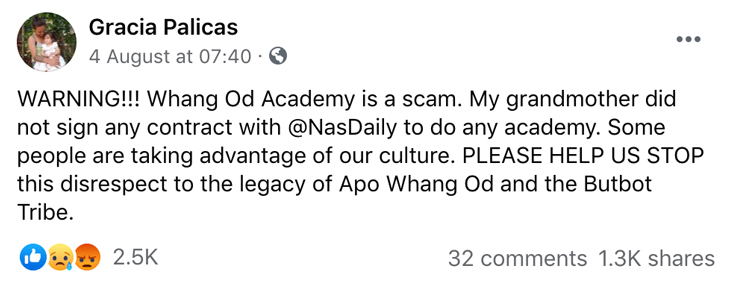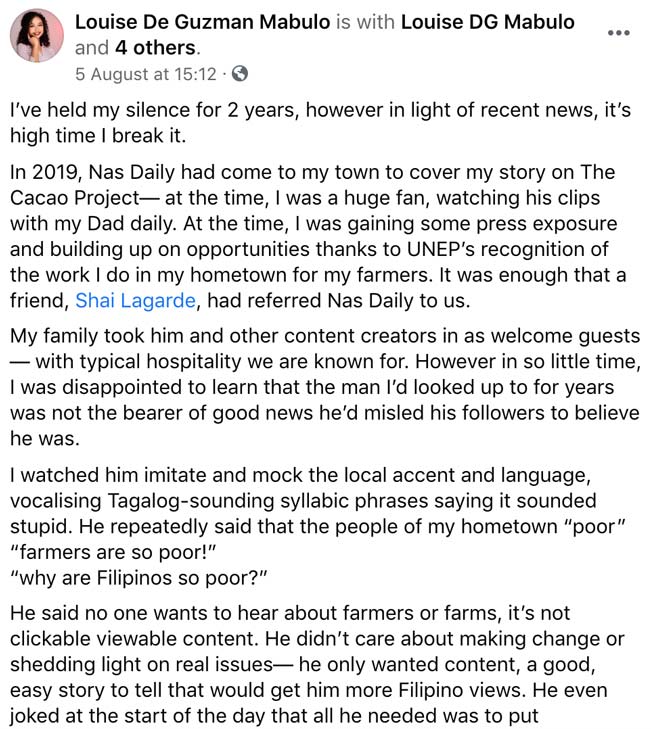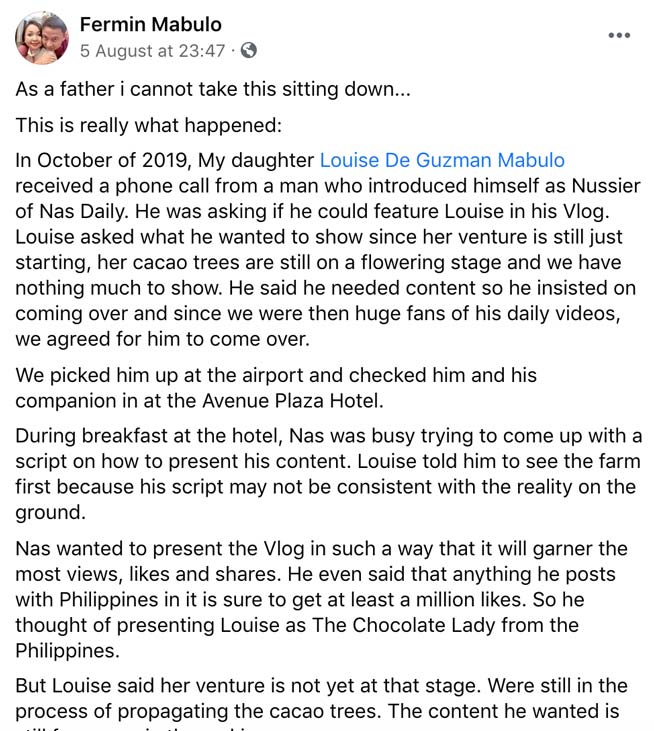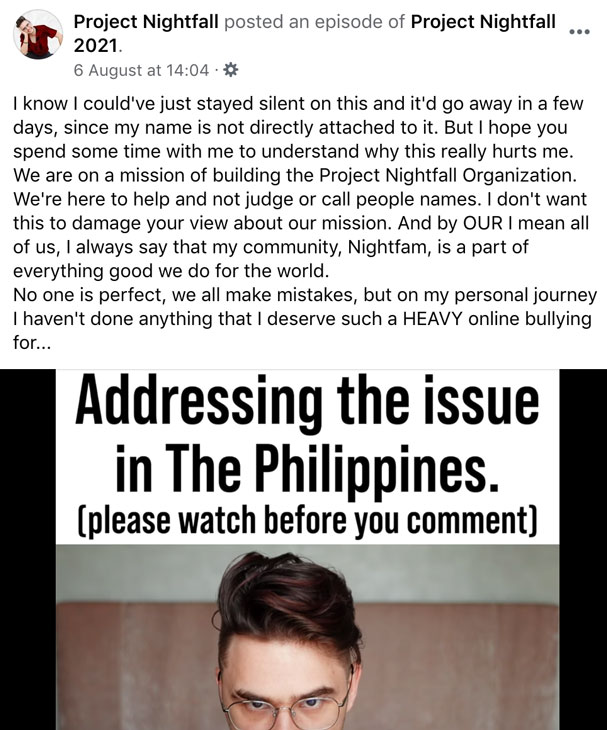The issue soon turned into a topic beyond the master mambabatok.
READ ALSO: Healing Hobby: The Mental Health Benefits Of Knitting And How It Can Help In Quarantine
Nuseir Yassin, the face of the popular Nas Daily videos, finds himself embroiled in a controversy. This is after Apo Whang-Od’s grandniece, Grace Palicas, called the video blogger’s online course featuring the tattoo master a “scam.”
Aptly named Whang-Od Academy, the course is part of the Philippine edition of Yassin’s Nas Academy. This is a platform that helps creators become educators through uploaded online courses that people can access upon enrollment and payment of fees. Signing up for the traditional tattooing course by Whang-Od costs $15 or around P750.

In a post, Palicas said that Whang-Od did not sign a contract with Nas Daily to teach “all her rituals, tools, and methods for making traditional tattoos,” and called out Yassin for the “disrespect” to her and her tribe’s legacy.
“Some people are taking advantage of our culture,” she wrote. “I spoke to her and she did not understand what the translators were saying. Our village’s concern is that some people are profiting and exploiting our art and culture.”
The 104-year-old artist is known as one of the oldest mambabatok or traditional tattoo artists from the Butbut tribe of Buscalan, Kalinga. In 2018, the National Commission for Culture and the Arts (NCCA) awarded her the Dangal ng Haraya Award for Intangible Cultural Heritage, a recognition given to living Filipinos for their achievements and contribution to the country’s arts and culture. Palicas, a tattoo artist herself, is a recognized apprentice of the art, learning the hand-tapped method using thorns and charcoal for ink directly from Whang-Od.
Following the backlash, Whang-Od Academy was taken down from the Nas Academy website.
The Arab-Israeli video creator, who has a wide array of content about the Philippines and also has a separate Facebook page called Nas Daily Tagalog, later issued a statement through Nas Academy’s official Facebook page and said that the course was not a scam, and that in fact, Whang-Od consented to it.
“We approached Whang-Od because just like you, we love her,” the post read. “We love her traditions and are inspired by her. We wanted to share her culture for future generations to appreciate and respect the ancient Kalinga tradition of mambabatok. So we pitched her family the idea of creating Whang-Od Academy. Her and her family present both loved this idea, and have worked with us to build it, with Whang-Od teaching herself.”
But the plot is apparently only beginning to thicken and the online community’s call out culture is front and center.
Speaking from experience
Amid all the backlash, Cacao Project founder Louise De Guzman Mabulo also aired her grievances against Yassin, recounting his 2019 visit to her hometown where he covered her social enterprise. The project aims to support the livelihood of farmers through cacao seedlings as a long-term crop that they can rotate with other short-term crops.
In a lengthy Facebook post, Mabulo accused the content creator of being rude, mocking the Filipino language, of being “exploitative,” and that “he only wanted content.”
A fan and regular viewer of Nas Daily videos at the time, she was soon disappointed by Yassin’s behavior during their encounter.

“I watched him imitate and mock the local accent and language, vocalizing Tagalog-sounding syllabic phrases saying it sounded stupid,” she wrote. Repeatedly, she added, the creator called FIlipinos and the people of her hometown poor, and that farmers are “not clickable, viewable content.”
“He didn’t care about making change or shedding light on real issues—he only wanted content, a good, easy story to tell that would get him more Filipino views,” she wrote. “He even joked at the start of the day that all he needed was to put ‘Philippines’ in the title, and he’d rack in millions of views and the comments would come flooding with brainless ‘Pinoy pride’ comments.”
Mabulo also claimed that apart from not thanking her family when they received him in their home and not eating the food prepared for him, he refused to let anyone take a break during the coverage and blamed his “lack of ‘presentable click-worthy content’” on her.
“He’d built a story in his mind without meaningfully understanding the context of what he was going to cover,” she explained. “As a result, he was disappointed that my work wasn’t the perfectly packaged story he’d pre-determined and imagined—I mean what visual popcorn can you create out of a farm?”
The award-winning project founder, who said she chose to stay silent to avoid backlash, added that she “should have known better that this man was exploitative and fueling a neocolonialist narrative using our need for foreign validation.”
To end her statement, Mabulo expressed support for Palicas and for her tribe to get the “justice and the compensation your tribe deserves from exploitative content creators.”
Fermin Mabulo, mayor of San Fernando in Camarines Sur and father of Louise, echoed his daughter’s sentiment in a Facebook post of his own, calling Yassin “full of himself,” “arrogant,” and “not exactly a role model for the young people to emulate.”

“His intended content is inconsistent with the realities on the ground,” the older Mabulo added. “We were very transparent about what we showed him but he was looking for something else.”
More call outs
Yassin, in a response, said he, too, kept his silence about the experience covering the story of Mabulo’s Cacao Project “out of respect to you.” He said he and his team were very excited for the story of how she revolutionized the cacao industry in her province, but was disappointed to see that it was not reflected on the ground.
“Once we arrived at your plantation, once we saw the village, and talked to the farmers, we came to the conclusion that there is no story here [and] that the awards on the Internet are just that—awards,” he wrote, referring to the prestigious award for young environmentalists she received, the Young Champions of the Earth Prize by The United Nations Environment Programme (UNEP).
“Our investigation has made it clear that your story in the media is false, and that there are no ‘200 farmers’ that you work with, and there are no cacao plantations that you don’t personally profit from,” he continued.
Polish content creator Agon Hare, who leads a Facebook page called Project Nightfall, said in a post that he was with Yassin during the visit to Mabulo’s estate to cover the project.
“We literally have footage of dying cocoa trees because the whole program was a failure. We tried so hard to make this video work,” he wrote in the comment section of Yassin’s response.
Hare said they “visited a few different farms and none of the farmers were growing the trees like she told us because they weren’t properly educated on how to take care of them. That was the reason why [the] video was never finished. Nowadays people can write anything on the Internet, and it instantly passes as truth. It’s very unfair.”
Hare’s comment was met with criticism and accusations that he, too, was ‘Pinoy-baiting’ his content for views, which he addressed in a video.

Though he also expressed contempt for what Yassin did to Apo Whang-Od, Keb Cuevas also called out the project founder in a separate post.
Cuevas, who introduced himself as a former classmate and son of a farmer, said being an owner of a plantation is not a social enterprise.
“When she defended her Cacao Project before in class, I asked, ‘So who owns the land?’ to which she answered that it is their family’s,” he wrote. “I then asked, ‘How is that a social enterprise?’ She did not answer. In short, it is not.”
In the same post, Cuevas dared Mabulo to defend herself and answer Yassin’s questions: Where are the 200 farmers and how are their incomes? Are they happy?
“If you have nothing to show, both of you are equally problematic and exploitative,” he pointed out.
But Cuevas, who is the founder of Tagani, a digital agribusiness platform that helps farmers monitor their farms using smartphones and connecting them to markets through e-commerce, was also called out by Jim Leandro for doing the same thing he called out Mabulo for—exploiting farmers and calling it a social enterprise. Leandro is a director for agritech at a tech company that develops digital solutions for agriculture.
“Not to mention, the ‘double degree in agriculture and business management’ from UPLB he brags about is fake,” Leandro wrote, clarifying that the BS Agribusiness and Management course offered by the College of Economics and Management at the University of the Philippines (UP) Los Banos is not a double degree program. “And you call yourself a chief agriculturist, when you’re not even a licensed agriculturist from PRC. Do you want to go viral, too? There is a lot of evidence and receipts about your foolishness.”
The series of call outs, which were happening on Facebook, then entered Twitter, through Ronald Gem Celestial, Leandro’s fellow UPLB alumni. According to his bio, he is a former University Student Council chairperson and the current communications director of Impact PH, an organization “for movement building, political action, and community transformation.”
“You have the audacity to call out fake credentials, yet you were missing in action when you were College Chair and USC Vice Chair,” he tweeted. “Just [have] integrity.”
The real issue
This never-ending saga of call outs, however, seems to have gone off-topic without having addressed anything, essentially burying the actual issue: Apo Whang-Od and the alleged exploitation of the Butbut tribe’s culture.
In the same Nas Academy statement, the platform refuted Palicas’ claim that Whang-Od did not understand the translation of the contract. They said Whang-Od’s niece, Estella Palangdao, interpreted the contract and witnessed the artist sign the document with her thumbprint, as seen in a video they included in the post. The academy considers this the “clearest evidence that it is not a scam and achieved the consent of her and her immediate family.”
“Everybody was compensated for their time, and for every sale the Whang-Od Academy generates, most of it went directly to her and her family,” the post continued. “We just provided the technology and the marketing.”
Whether the video evidence is true or not, the problem may be more than just Whang-Od signing a document.
According to a Facebook post by UP anthropology professor Nestor Castro, Yassin should first understand Kalinga culture and that “getting the permission of one individual is not enough.”
“Whang-od is not just an individual artist but she is also a member of the [tribe]. Her skill on the art of traditional tattooing is derived from the indigenous knowledge of generations of Kalinga ancestors,” he wrote. “Thus, this indigenous knowledge is collectively owned—although it may be individually practiced—by the Butbut. The consent of the members of the [tribe] is necessary if this knowledge is to be shared to outsiders.”
This collective consent is also necessary “when the knowledge of indigenous peoples is used for commercial purposes.” According to the Republic Act No. 8371 or the Indigenous Peoples Rights Act (IPRA) and its Implementing Rules and Regulations, free and prior informed consent (FPIC) is required and is secured from the members of the ancestral domain, “in this case, the members of the Butbut tribe.”
“The agreement between the parties should also be written in English and the local Kinalingga language and witnessed by the National Commission for Indigenous Peoples (NCIP),” Castro added. “I believe that the problem can still be corrected if Nas Daily respects Kalinga culture and follows the law.”
As of August 8, Nas Daily has lost almost 600,000 followers.
Catriona Gray, through a statement released Sunday afternoon, said that she, Cornerstone Entertainment, and Nas Academy “have agreed to stop accepting new applicants for the Catriona Gray Academy until the issue of Whang-Od has been fully resolved.”
Vanjo Merano, the Chicago-based Filipino behind the Youtube channel Panlasang Pinoy, also announced on Facebook that he will no longer pursue his participation in the online learning platform “in support of Apo and the exploited Pinoy hospitality.”
A “misunderstood” Nas Academy, meanwhile, has paused its operations in the country, while reiterating their commitment to work things out.
“We are committed to working with the NCIP to ensure that all proper processes are followed,” the website’s landing page reads. “Meanwhile, we will focus on strengthening our processes around how we collaborate with our partners.”
Banner Photo from @Nasdaily on IG





